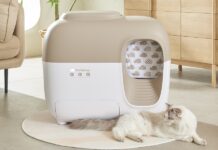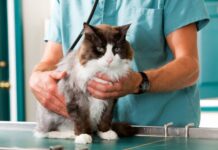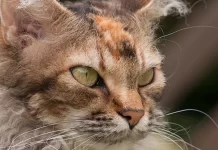Last Updated on August 28, 2023 by Fumipets
The Majestic Maine Coon: Gentle Giants of the Cat World
The Maine Coon, often referred to as the “gentle giant” of the cat world, is a remarkable breed known for its large size, striking appearance, and friendly personality.
Originating in the United States, Maine Coons are characterized by their tufted ears, bushy tails, and impressive coats. Despite their grandeur, they are known for their affectionate nature and adaptability, making them cherished companions for cat enthusiasts around the world.
Maine Coon
Maine coons are big, loving cats who like spending time with their owners and playing with them. Although owners of Maine coons recognize and appreciate these cats for being affectionate family pets, this cat species is mainly noted for its enormous size—up to 40 inches in length.
Given that the Maine coon almost went extinct at one time, the breed’s popularity is remarkable. The Maine Coon was ranked sixth in terms of popularity among cat breeds by the Cat Fanciers’ Association in 2019. Depending on pedigree, a Maine Coon kitten typically ranges in price from $400 to $1,500.
Appearance
The biggest domestic cat breed is the Maine coon, and size is undoubtedly one of its distinguishing physical traits. A normal Maine coon may grow to be between 10 and 16 inches tall and up to an astonishing 40 inches long. Typically weighing 8 to 18 pounds, these robustly built felines have strong bodies with broad chests and sturdy legs.
As if their massive frame wasn’t enough, the Main coone’s thick covering of fur makes these beautiful creatures seem even larger. They have a thick, smooth, lengthy coat that becomes shorter around the shoulders. The colors and patterns of Maine coons are varied. In addition to tabby, bi-color, particolor, tortoiseshell, shaded, and calico Maine coons, you may also get plain white, cream, red, blue, and black Maine coons.
Large pointed ears that are often covered in wisps of hair, expressive oval-shaped eyes, and a long, bushy tail are other distinguishing physical characteristics.

Temperament
Keep in mind that despite their intimidating size, Maine coons are really gentle giants that like spending time with their owners. They don’t value privacy or personal space too much and demand to be included in the family. These cats love the idea of following you about as you go about your day, from room to room.
Although Maine coons are undoubtedly gregarious and friendly, they are not often lap cats. Given its size, this species often likes to hang out next to you rather than on top of you, which may be a good thing.
Maine coons have a high level of intelligence, are energetic, and will play like kittens long into old age. They are referred to as the “clowns of the cat world” by the Maine Coon Cat Club. Being a non-aggressive breed, they will accept being picked up, hugged, and held. These creatures are nice, tolerant, and amiable toward kids.
Living Needs
A devoted, caring household with the time to play and the desire to integrate this cat into all facets of daily life is the Maine coon’s most important demand. These tolerant animals get along well with children, dogs, and other cats.
While Maine coons may be left alone for extended periods of time, they won’t like it. These cats may get depressed and worried when left alone often, so it’s ideal to place them with a household that frequently has at least one or two humans home throughout the day to provide some companionship.
Most Maine coons like being in the water. The good news is that they won’t follow you into the shower or attempt to stop you from doing the dishes, but the bad news is that bath time will be ruined.
Although these large cats love to vocalize and connect with their owners, you may be surprised by how silent they are.
Maine coons are wonderful household pets. You won’t find a more devoted, affectionate feline companion than one of this breed if you have the time, patience, and love to devote to them.
Care
The thick, shaggy hair of Maine coons needs regular brushing to prevent matting and tangling, according to Catherine Lenox, DVM, DACVN, a board-certified veterinary nutritionist with Royal Canin.
Your Maine coon will need weekly to monthly bathing as well as consistent, focused grooming. Although their lengthy coats are often silky smooth, it’s time for a wash when they begin to appear oily or stringy. In order to prevent their lengthy hair and undercoat from becoming matted and knotted, they also need to be brushed once a week. These cats do shed a lot, so frequent brushing will also aid in removing any stray hairs. Don’t worry, grooming the Maine coon is often enjoyable since it enjoys any kind of attention.
Maine coons don’t need any specific exercise, and they follow the same routine as other cats in terms of extended stretches of sleep interspersed with lively bursts of leaping and racing about the home. They may release some of their energy with cat trees and toys.
These very smart cats are simple to teach. The Maine coon may be taught to play fetch or walk on a leash outside, and some owners have referred to them as “dog-like” because of this. Although these giant cats may need a large litter box to let them comfortably relieve themselves, they rapidly pick up on basic housetraining and litter box usage.
Early socialization is important for Maine coons. If you’re bringing a Maine coon kitten home as a family pet, be sure to allow all household members—small children included—to gently touch the cat on a regular basis. If at all feasible, they should also be introduced to other pets. Your cat won’t become timid and reserved thanks to these early encounters.
To avoid overeating, feed your Maine coon high-quality cat food and keep an eye on their diet. To find out how much and how frequently to feed your specific cat, see your veterinarian.

Health
Maine coons are normally healthy pets with a lifetime of 10 to 13 years. There are certain health concerns to be mindful of, however, as with any breeds.
Lenox notes that Maine coons have a higher risk of developing joint disorders such arthritis or hip dysplasia because of their big height. Additionally, the breed of Maine Coons is prone to dental disorders and hypertrophic cardiomyopathy (HCM).
Reputable breeders will check your kitten for health problems, but it’s crucial to continue screening them until they are adults. HCM and other health issues may not show up in your cat’s early years.
History
The majority of specialists believe that the Maine coon is a descendant of exotic long-haired cats that were introduced to American shores by early explorers in—where else?—Maine. The sole native long-haired cat in the United States was produced when the ship cats crossed with the local short-haired varieties. There are many explanations for how the Maine coon earned its name, including one that connects the breed’s origins to a sailor by the name of Charles Coon and another that attributes the name to the cat’s bushy tail, which resembles a raccoon.
The native breed of New England briefly saw fame in 19th-century cat displays before being eclipsed by more exotic species and seeing a rebirth in the 1950s. The Maine coon breed is normally a robust and healthy breed since it was allowed to evolve organically from the 1800s to the middle of the 20th century. Many of the traits that allowed the breed’s first iteration survive the severe New England winters are still present in the current Maine coon, including its strong hunting drive, which makes these affectionate indoor cats great mousers.
On May 8, 1895, the first cat exhibition in North America was staged at Madison Square Garden in New York City, and Cosey, a female Maine coon, won Best in exhibition. The Cat Fanciers’ Association (CFA) Foundation eventually acquired the silver collar Cosey won, and it is currently on display at their offices as a significant piece of cat history.
Q&A: Maine Coon
1. What is a Maine Coon cat?
The Maine Coon is a breed of domestic cat known for its large size, tufted ears, bushy tail, and luxurious coat. It’s considered one of the largest domestic cat breeds and is celebrated for its friendly and sociable demeanor.
2. What sets the Maine Coon apart from other cat breeds?
The Maine Coon’s most distinguishing features are its large size and tufted ears. It also boasts a water-resistant coat, which is thought to have developed as an adaptation to the cold climate of its native Maine.
3. Are Maine Coons good family pets?
Yes, Maine Coons are often excellent family pets. They are known for their gentle and friendly nature, making them suitable companions for children and other pets. Their adaptability and sociable behavior contribute to their popularity as family members.
4. How should I care for a Maine Coon’s coat?
Maine Coons have long, thick fur that requires regular grooming to prevent matting and maintain its health. Regular brushing helps keep their coat free from tangles and reduces shedding. A bath every few months can also help keep their coat clean and healthy.
5. Do Maine Coons have any health considerations?
Maine Coons are generally healthy cats, but like all breeds, they may be prone to certain genetic health issues, such as hip dysplasia and hypertrophic cardiomyopathy (a heart condition). Regular veterinary check-ups and a balanced diet are important for maintaining their overall well-being.
https://www.youtube.com/watch?v=kIJdrLPqAts


















